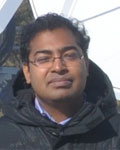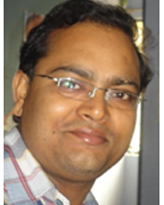Keynote Speakers
Dr. A.P. James, Nazarbayev University, Republic of Kazakhstan
 Title of Talk: Neuromorphic Vision and Resistive Threshold Logic Networks: Seeing Beyond Camera Sensors
Title of Talk: Neuromorphic Vision and Resistive Threshold Logic Networks: Seeing Beyond Camera Sensors
Abstract: The emergence of smart materials, devices, circuits and subsequently systems offer us the flexibility to envision newer directions in low level vision processing. In this talk, the advances in a hardware solution to the problem of the object recognition using the idea of reconfigurable resistive threshold logic networks for memorising the image features and providing a matching process of face image pixels from the sensor array is discussed. The need for higher imaging resolution increases with increase in natural variability such as that reflected through illumination changes, occlusions, pose variations, and age related changes. In real-time implementations, a finer space time resolution, i.e. high speed and high resolution would enable good quality features; however, it is practically difficult to accommodate such requirements in existing systems due to high bandwidth, processing complexity of algorithms and memory requirements posed by recognition algorithms. The emerging research directions in cognitive computing with on-chip implementations of brain inspired vision systems that would be capable of predicting the object state offer new solutions to overcome the big bandwidth and resolution challenges. In addition, this talk advocates for the paradigm shift from algorithmic approaches to on-chip processing approaches to solve the most complex low level vision challenges facing the camera systems today.
Biography: Alex Pappachen James received his Ph.D. from Griffith School of Engineering, Griffith University completing in short 2 year duration in the area of bio-inspired cognitive face recognition system. He is currently a professorial faculty with School of Engineering, Nazarbayev University and CEO/founder of the start-up Enview R&D Labs. He has an extensive industry and academic experience working on research projects in the area of board design, embedded systems, and integrated circuits for neuron inspired systems. His research deals with bio-inspired circuit, algorithms and systems in particular to applications involving low level vision processing, sensor data fusion and decisions in the domains of use in biomedical, nanosystems and sustainable engineering.".Dr James is a senior member of IEEE and is actively involved in the development of leading societies in the area of brain inspired systems. He is active as a reviewer, external examiner to PhD thesis, conference committees, authoring in journals and mentor to graduate students. He is widely travelled and enjoys research collaborations with like-minded researchers from across the world. More info: www.biomicrosystems.info/apj
Dr. Praveen RanjanSrivastava, Indian Institute of Management (IIM), Rohtak, India
 Title of Talk: Software Coverage: An intelligent Technique using Nature inspired Computing
Title of Talk: Software Coverage: An intelligent Technique using Nature inspired Computing
Abstract: Software Coverage is one of the most challenging and arduous phase of software development life cycle which helps in determining the software quality. State/Code coverage are widely used paradigm, which describes the degree to which the state/code has been tested. Aim of the current discussion is to propose an optimised code coverage algorithm with the help of an emerging technique (nature inspired principle/ Meta-heuristic algorithm), i.e., Intelligent Water Drop (IWD), Cuckoo Search, Ant Colony, Firefly etc. These approaches use dynamic parameters for finding all the optimal paths using basic properties of natural things. It tries to provide a technique for exhaustive coverage with minimal repetition which ensures all transitions coverage and all paths coverage at least once with minimal number of repetitions of states as well as transitions. The algorithm works by maximising an objective function which focuses on most error prone parts of the program so that critical portions can be tested first
Biography: Dr. Praveen RanjanSrivastavais working as an Assistant Professor in the Information Technology and Systems Group at Indian Institute of Management (IIM), Rohtak, India. His H Index is 11, I index is 13, RG is 12.33. He is currently doing research in the area of software Engineering and Management using novel metaheuristic techniques. His research areas are software testing, quality management; effort management, software release management, expert system, decision science and advanced soft computing techniques. He has published more than 120 research papers in various leading international journals and conferences in the area of software engineering and management. His prime research area is software validation. He is an Editor in Chief of International Journal of Software Engineering application and Technology (IJSEAT), published by Inderscience. He is also member of Editorial Board of various leading journals.
For more Details visit:
DBLP (http://www.informatik.uni-trier.de/~ley/pers/hd/s/Srivastava:Praveen_Ranjan)
Google Citation (http://scholar.google.co.in/citations?user=TjVMlqYAAAAJ&hl=en)
Research Gate (https://www.researchgate.net/profile/Dr_Praveen_Srivastava)
Scoups (http://www.scopus.com/authid/detail.url?authorId=25227132200)
Sponsors & Supporters





